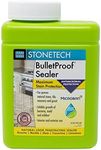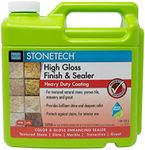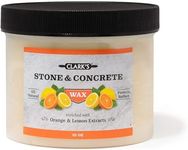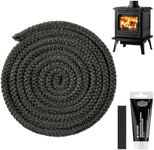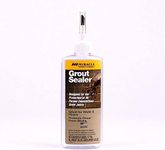Buying Guide for the Best Stone Sealers
Choosing the right stone sealer is important to protect your natural stone surfaces from stains, moisture, and wear. Whether you have granite countertops, marble floors, or outdoor pavers, the right sealer can help maintain the beauty and durability of your stone. To make the best choice, you should understand the different types of sealers and the key features that matter most for your specific stone and its location.Type of SealerThe type of sealer refers to how the product interacts with the stone. There are two main types: penetrating (impregnating) sealers and topical (surface) sealers. Penetrating sealers soak into the stone and protect it from within, making them ideal for most natural stones as they don't change the appearance or texture. Topical sealers form a protective layer on the surface, which can add shine but may also alter the look and feel of the stone. If you want to keep the natural look, go for a penetrating sealer. If you want extra shine or a wet look, a topical sealer might be better. Consider where the stone is used—high-traffic or outdoor areas often benefit from penetrating sealers.
Finish (Appearance After Application)The finish describes how the stone will look after the sealer is applied. Some sealers are designed to be invisible and maintain the stone’s natural appearance, while others can enhance color or add a glossy or matte finish. If you want your stone to look as natural as possible, choose a sealer labeled as 'natural look' or 'invisible.' If you prefer a richer color or a shiny surface, look for 'enhancing' or 'gloss' finishes. Think about your style preferences and the look you want for your space.
Water and Stain ResistanceThis spec tells you how well the sealer protects against water, oil, and other stains. Some sealers are specifically formulated to block water, while others also protect against oil-based stains. If your stone is in a kitchen or bathroom, or outdoors where it’s exposed to rain, strong water and stain resistance is important. Check the product description for what types of stains it protects against and choose based on the typical risks in your area.
BreathabilityBreathability means the sealer allows moisture vapor to escape from the stone while still blocking liquids from entering. This is important because trapped moisture can cause damage over time, especially in outdoor or damp environments. Penetrating sealers are usually more breathable than topical ones. If your stone is outside or in a humid area, prioritize a breathable sealer to prevent issues like flaking or discoloration.
Durability and LongevityDurability refers to how long the sealer will last before you need to reapply it. Some sealers last only a year, while others can protect for several years. If you want less maintenance, look for a sealer with a longer lifespan. The right choice depends on how much wear and tear your stone gets—high-traffic areas or outdoor stones may need more frequent resealing, so a longer-lasting product can save you effort.
Suitability for Stone TypeNot all sealers work well with every type of stone. Some stones, like marble and limestone, are more porous and need a stronger or more penetrating sealer, while others like granite are less absorbent. Always check if the sealer is recommended for your specific stone type. Using the wrong sealer can lead to poor protection or even damage, so match the product to your stone for the best results.
Ease of ApplicationEase of application refers to how simple it is to apply the sealer. Some products are spray-on and wipe-off, while others require more steps or special tools. If you prefer a quick and easy process, look for user-friendly options with clear instructions. If you’re comfortable with a bit more work for better results, you might choose a more involved application. Consider your comfort level and the size of the area you need to seal.


